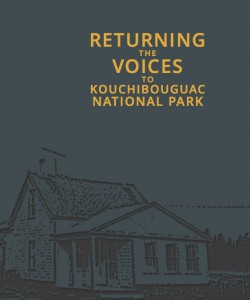Project Showcase: Returning the Voices to Kouchibouguac
21 May 2013 – editors
 In 1969 the Canadian and New Brunswick governments agreed to create Kouchibouguac National Park along the east coast of this Atlantic province. At the time, establishment of a national park required removing the people who resided there, in the belief that nature should be exhibited to visitors without signs of any human presence. Over 1200 individuals were uprooted, having been told that their lives were worthless and that they could only be helped by being forced to move.
In 1969 the Canadian and New Brunswick governments agreed to create Kouchibouguac National Park along the east coast of this Atlantic province. At the time, establishment of a national park required removing the people who resided there, in the belief that nature should be exhibited to visitors without signs of any human presence. Over 1200 individuals were uprooted, having been told that their lives were worthless and that they could only be helped by being forced to move.
But government officials had not taken into account how this particular case of forced removal would be viewed by the residents, most of whom were Acadians, a people with a strong memory of having been deported by the British in the mid-18th century. There was large-scale resistance that resulted in the park being shut down on several occasions.
And the leader of the resistance, Jackie Vautour, remains a squatter on his land to this day.
The Kouchibouguac story of removal and resistance has provided a source of inspiration for Acadian artists working in a variety of genres. But the story of resistance only tells part of what happened at Kouchibouguac, because most families simply and quietly left their lands to create new lives, often within kilometres of the borders of the park. Returning the Voices to Kouchibouguac National Park tells a wide range of stories inspired by the experiences of the residents.
The central feature of the site is the presentation of 26 video portraits drawn from interviews with former residents, who often told their stories while standing on the lands where they once lived. (One of these videos has been embedded below.) Visitors are encouraged to interact with the map that was created at the time of the expropriation to facilitate the process. Here, however, the map has been subverted to serve as a navigational device to return the voices of the residents to their lands.
The residents who were removed to allow the creation of Kouchibouguac National Park can never return to their lands, but this project makes it possible for some of their voices to return, if only virtually.
~ Ronald Rudin, Concordia University




1 comment